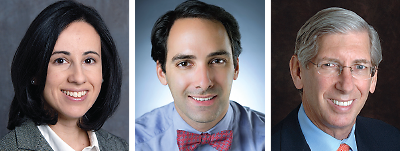Cultivating the Next Generation of Psychiatrists

The beginning of a psychiatrist’s career after residency or fellowship is an exciting, but daunting, time. Whatever career path he or she is pursuing—clinical practice, academics, public sector, or industry—the transition from trainee to professional is critically important and often stressful. There is the challenge of having primary responsibility for one’s own patients. The desire to become comfortable in a new work environment and with new colleagues. The understanding that no matter how thorough our training has been, there remain difficult situations that arise in practice, testing our knowledge and mettle.
APA well understands the need to support psychiatrists at this stage of their development and even has a special name for them: early career psychiatrists (ECPs). Every psychiatrist and member of APA has faced this juncture in their careers. Consequently, we recently reviewed APA membership survey data to learn what special needs and services applied to this important constituency of our profession.
We were surprised to see that while resident-fellow members saw value and were pleased with APA membership, many weren’t continuing their membership as they entered the field and the professional workforce. We wondered whether this may be due to the fact that, in a changing and challenging environment, we may too often focus on the challenge of the moment over our longer term professional needs and enrichment. This problem was particularly concerning since APA membership is especially helpful early in one’s career for educational and mentoring resources. And more importantly, young members strengthen APA and shape the Association now and for the future.
To examine this issue, we co-chaired a work group of ECP members and two senior APA advisors to find out what APA was—and wasn’t—doing to support the needs of psychiatrists just starting in the field and what could be done better. Based on the work group’s recommendations, APA, with the full support of the Board of Trustees, is focused on making sure that the needs of psychiatrists just starting their careers are optimally addressed.
Ongoing learning is key for any professional, but it is perhaps especially important in the field of medicine, in which the stakes are so high for our patients and the advancements can be so significant. APA has long had a commitment to continuing professional education, both through our annual meeting and the development and dissemination of a wealth of online and published resources. We are working to make APA’s professional education resources more accessible to our ECPs through better and more central aggregation online. We also need to make these members more aware of these educational resources and how they are relevant in real-life practice.
The work group of ECP members, tapping into this generation of ECPs, has been instrumental in helping APA improve the way we tailor information to members. APA staff are currently engaged in developing new systems of electronic outreach, organized into “communities,” that we believe will aid in this process. We’ll soon be asking our membership how they like to receive information and on which topics. This should reduce the amount of irrelevant content our busy professionals receive and make information from APA an “always open” event.
APA also recognizes that some of the most meaningful learning occurs among colleagues, both peers and those more experienced. We now recognize the need to continue and expand these activities, including facilitating more engagement in online networks and providing more structured opportunities for members to serve as, and ask for, mentors. That’s why APA has created virtual and in-person mentoring opportunities. The former include member-led online discussion groups on Facebook and LinkedIn; the latter include annual meeting events and district branch activities for ECPs.
Building a meaningful career also requires looking for, and participating in, leadership opportunities. APA needs and wants the participation of psychiatrists at all stages of their careers, including their involvement on councils and committees. This is a win-win for both the psychiatrist, who has an opportunity to learn from leaders in the field, as well as for our Association, which is energized and made more relevant with the input of younger members. Recognizing that the process for becoming involved at this level may have been a bit mysterious in the past, APA will be more proactive in making our members more aware of these opportunities for committee and council service, as well as making the selection process more transparent.
As important as these changes are, we recognize that they can’t be just one-time activities. So APA’s Board has assembled an ongoing ECP advisory panel to continue to meet and report to the Board and CEO. APA has also created a new staff position, chief RFM-ECP officer, and has hired Jon Fanning to fill this critical role. Jon comes to us after having served as director of the Resident and Fellow Section of the AMA.
Finally, it is important to understand that the way in which health care (including mental health care) is delivered and financed has just begun to undergo transformative change through the health care reform process being driven by, among other forces, the Affordable Care Act (ObamaCare) and the Mental Health Parity and Addiction Equity Act. In this fast-changing environment, APA is the best guide and representative for young psychiatrists to effectively navigate the new landscape of health care.
There are many reasons why ECPs should become and stay engaged with APA. But, just as important, APA needs what ECPs can provide to APA and the field of psychiatry. That’s why we’ll work hard to make sure they stay involved.
If you have suggestions on how APA can address the needs of members at this stage of their career, please contact Fanning at [email protected]. ■
You can follow Dr. Lieberman on Twitter at @DrJlieberman. To do so, go to https://twitter.com/DrJlieberman, log in or register, and click on “Follow.”.



